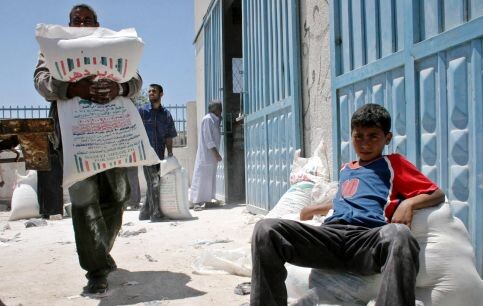The Electronic Intifada 6 July 2010

Micro-finance programs ignore Israel’s deliberate debilitation of the Palestinian economy and only perpetuate economic dependency. (Hatem Omar/MaanImages)
The boycott, divestment and sanctions (BDS) movement is gaining significant momentum cross the United States and Europe, including at US campuses. In response, opposition to the movement is devising new ways to divert attention from efforts to hold Israel accountable for its violations of international law and flagrant abuses of Palestinian human rights.
At Stanford University, the school I graduated from last year, the Stanford Israel Alliance has created a counter-divestment campaign called “Invest For Peace.” Cloaked in the language of good intentions, Invest For Peace suggests that their campaign will work to uplift Palestinian society and economy by raising money to invest in micro-finance organizations in Israel and the occupied West Bank and Gaza Strip. Their mission states that in contrast to divestment, Invest For Peace makes positive contributions that “move beyond counterproductive rhetoric.” Invest For Peace calls for campus unity by suggesting it aspires to the same goal as the divestment movements, but by different means. This campaign muddies the issue by conflating the goals of campus unity and advancing justice, not to mention aligning itself with the policies of Israeli Prime Minister Benjamin Netanyahu.
The goal of divestment is to expose Israel’s oppressive policies and bring pressure to bear on Israel to end them. Stanford’s Invest For Peace campaign utterly denies Israel’s integral role in the debilitation of the Palestinian economy and therefore can have no credibility as a force to ameliorate the conflict. It ignores the fact that Israel has systematically and deliberately devastated Palestinian civil and economic society through its decades of usurpation of resources and military occupation.
The similarity in rhetoric between Invest for Peace and the Netanyahu government is conspicuous. Last year, Netanyahu called for an “economic peace” with the Palestinians, as opposed to a peace based on negotiations, rights and justice. In spite of his talk of improving the standard of living among Palestinians, Netanyahu has continued and expanded Israel’s policy of building settlements on Palestinian land in violation of international law while the siege of Gaza enters its 36th month. Netanyahu’s talk of an “economic peace” is empty rhetoric designed to disguise nefarious policies.
Moreover, investing in micro-finance organizations while demanding continued unquestioned US aid to Israel and its military is like dropping a quarter in someone’s tin cup after you’ve chopped off her hands. When Israel disconnects Palestinian orange groves from their water supplies, uproots its olive trees and cuts Gaza off from any potential trade, it commits intentional acts of destruction to the Palestinian economy. Invest For Peace speaks of the deterioration of the Palestinian economy as though it were a natural disaster, without specific and man-made origins, designed to ensure Palestinian economic dependency and penury.
In her book Failing Peace and other works, Harvard’s Sara Roy chronicles the deterioration of the Palestinian economy as it relates directly to Israel’s occupation and control of trade and borders. Roy identifies Israel’s imposition of closure policies as well as its division of Palestinian land as the principle culprits of the rapidly declining Palestinian economy. She states that “The result is de-development — a process I define as the deliberate, systematic and progressive dismemberment of an indigenous economy by a dominant one, where economic — and by extension — societal-potential is not only distorted but denied.”
Roy is not alone in her assessment. The World Bank has indicted Israel’s system of checkpoints, roadblocks, and obstructions to Palestinian movement as the chief source of the decaying economic life in the West Bank and Gaza Strip. In a 2007 report entitled “Movement and Access Restrictions in the West Bank,” the World Bank called for an overhaul in Israel’s treatment of the occupied West Bank and Gaza Strip, prescribing “a fundamental reassessment of closure practices, a restoration of the presumption of movement, and review of Israeli control of the population registry and other means of dictating the residency of Palestinians” (“West Bank Restrictions,” [PDF]).
Considering the brutality of Israeli policies and the clear effects they have on the Palestinian economy, it is hard to take seriously the Invest For Peace campaign’s assertion that it is seeking to take “effective action” to remediate poverty in the occupied West Bank and Gaza Strip. In an op-ed published by the Stanford Daily, Stanford student and member of the Stanford Israel Alliance and Invest For Peace, Yishai Kabaker argued that “In my experience with divestment when applied to this conflict, damage is wrought, but nothing positive comes of it.” He added: “In the past, divestment campaigns helped combat apartheid in South Africa and genocide in Darfur. However, the divestment campaign against Israel is a crass bludgeon, which reduces an incredibly complex situation to euphemisms and demonizations” (“We Choose to Invest,” 4 May 2010). Yet, the dissolution of Israel’s policies is precisely the “positive” outcome that divestment campaigns intend to achieve.
Historically, Israel-allied groups have inhibited Palestinian solidarity groups from gaining prominence on college campuses across the country. But that time is ending. The astonishing mobilization and collaboration that divestment efforts at schools like UC Berkeley, Hampshire College and Evergreen State College are generating reflect the broad support for divestment and the success that it will eventually achieve. Public opinion is catching up to the radical reality of Israeli policies in Palestine. The train for BDS has left the station, and you’re not going to catch it if you’re running in the opposite direction.
Charlotte Silver is a litigation assistant at the American Civil Liberties Union, Immigrant Rights Project and was active in the boycott, divestment and sanctions movement at Stanford. She lives in San Francisco and can be reached at charlottesilver A T gmail D O T com.




